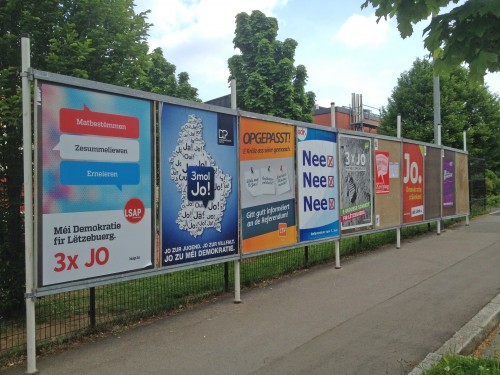These are exciting times for civil rights in the European Union, especially in Ireland and Luxembourg.
Two weeks ago, the Republic of Ireland voted for marriage equality. Much of Europe considers Ireland to be slow to adopt progressive legal structures, particularly regarding women and LGBT persons. The overwhelming vote for the 34th amendment to the Irish constitution put paid to that reputation. The Irish moved from political silence to civil partnerships to equal marriage in just a decade.
Here in Luxembourg, same-sex marriages became legal on the first of this year, by parliamentary legislation. This week, Luxembourgers are considering whether to extend another civil right: voting.
No, no, don’t misunderstand: LGBT people aren’t denied the right to vote in Luxembourg! The question before the polity is whether to extend voting rights beyond citizens to include long-term and demonstrably committed residents. This Sunday, June 7, Luxembourg’s citizens vote on that constitutional question.
The connection between citizenship and voting (or the lack thereof) was a big part of my graduate studies, so I’m deeply interested in the result of next week’s vote. I’m paying special attention to the arguments for and against granting voting rights to non-citizens.
For many political thinkers, especially Americans, the very concepts of citizenship and voting are so intimately related that it’s hard to imagine arguments that disconnect the two. I’m excited to be able to say, “There’s no need to imagine them. We have real ones right here in Luxembourg!”
There are actually three questions before the Luxembourgeois next week, including voting rights extended to 16-year-old citizens and term limits for ministers. Youth voting is another issue that fascinates me. I am a proponent for lowering the voting age in the US, mostly on the grounds that it would help get citizens into the “habit†of voting. Such radical measures are necessary, I believe, because both the legitimacy and the quality of American government are weakened by scandalously low voter turnout.
But that justification doesn’t apply here, since voting is mandatory and low voter turnout isn’t a real problem. I haven’t gotten a handle on the debate here — the substantive reasons offered for and against the idea — and I’m looking forward to learning a lot more this week!
Creative-Commons-licensed image above courtesy of wikicommons user Bdx. By the way, “Jo” is “Yes” in Luxembourgish, and “Nee” is “No”.

Trackbacks & Pingbacks
The Poster Debate on Luxembourg’s Referendum: Part One · Bakker Bugle Blog
Pingback on June 5th, 2015 at 13:01